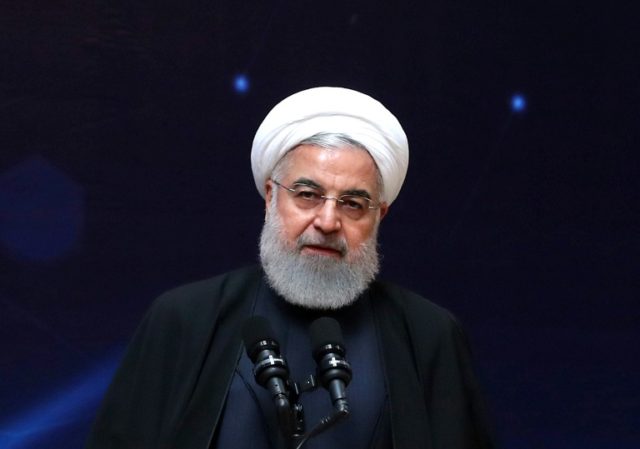Iranian President Hassan Rouhani on Monday criticized U.S. policies in the Middle East as “destabilizing” and said they would ultimately harm the American people.
“These destabilizing actions of the U.S. in the region will undoubtedly be detrimental to the peoples of the region, and even the American people,” Rouhani said in a telephone conversation with Iraqi President Barham Salih.
“All regional countries need to understand the current critical conditions and cooperate with each other to stop U.S. bullying aimed at creating instability in the region,” Rouhani said, according to Iran’s Tasnim News Agency.
Rouhani, who the previous U.S. administration hailed as a “moderate reformer,” also condemned Israel for defending itself against a massive rocket attack from Iran-backed Palestinian terrorists in Gaza.
“These acts of aggression of the Zionist regime are happening every day and it is essential that Islamic countries become more active in this field and prevent these acts,” the Iranian president fulminated.
Salih reportedly agreed with Rouhani’s take on Gaza. “As the leaders of Islamic countries, our duty is to help the oppressed people of Palestine and end the Zionist regime’s acts of aggression,” he said.
Rouhani hit some of the same notes in a televised speech to Iranians on Sunday, in which he denounced U.S. sanctions and the terrorist designation of Iran’s brutal Islamic Revolutionary Guard Corps (IRGC) as a “war on hope.”
“America will only let go of this game when it realizes it cannot achieve anything. We have no way but to resist and unite,” he declared.
“Our war today is the war on hope. They want to break our hope, and we have to break their hope,” he continued, denouncing U.S. efforts to cut off the Iranian regime’s access to foreign currency and “sow discord in the country.”
“We should increase production and raise our exports and resist America’s plots against the sale of our oil,” he urged.
Rouhani’s earlier bluster about the paltry insignificance of U.S. sanctions appears to have ended since the crushing effect of those measures on the Iranian economy is now impossible to ignore or spin away.
Iran’s gamble that the Trump administration would be unable to maintain tight oil sanctions because world prices would spike as the oil supply contracted did not pay off. Even Iran’s most reliable rescuer, China, appears to be having second thoughts about defying U.S. sanctions to continue purchasing Iranian oil after the sanctions waiver expired, although Beijing will probably tie its ultimate decision to the ultimate resolution of the U.S.-China trade war.
Iran’s most promising strategy is to bypass sanctions by selling oil through a “grey market” using cryptocurrency, but Rouhani’s own officials admit this tactic is unlikely to bring more than a fraction of the revenue Tehran enjoyed before President Donald Trump withdrew from the Iran nuclear deal and restored sanctions.
Rouhani had a rough weekend, as his younger brother and confidant Hossein Fereidoun was sentenced to prison on corruption charges. The Iranian president was born with the last name Fereidoun but changed his name to Rouhani in the 1970s to elude capture by the Shah’s secret police.
Hossein Fereidoun served as an Iranian diplomat and was part of the team that negotiated the 2015 nuclear deal with U.S. President Barack Obama. As is customary with Iran’s legal system, the exact nature of the corruption charges against him is murky and the details of his sentence were not disclosed by the court.
Supporters of Rouhani believe political enemies in the judiciary have unfairly hounded his brother in a bid to undermine the president.
“I strongly and categorically reject allegations against me in the court and some of the media, and I’m protesting,” a defiant Fereidoun said after his sentencing, signaling his intention to appeal.

COMMENTS
Please let us know if you're having issues with commenting.